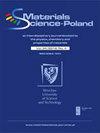Prediction of microstructural evolution in fly ash-modified cementitious system: A computational study
IF 1.3
4区 材料科学
Q4 MATERIALS SCIENCE, MULTIDISCIPLINARY
引用次数: 0
Abstract
The intricate interaction between supplementary cementitious materials (SCMs) and cementitious systems profoundly influences the performance and sustainability of cementitious composites. This study explores the microstructural evolution of fly ash (FA)-modified cement paste by employing a three-dimensional cement hydration and microstructure development (CEMHYD3D) modeling package. Through comprehensive simulations, the influence of varying FA content on hydration phase evolution and pore structure within the cementitious system is revealed. As the proportion of FA within the cementitious mixtures increases, there is a substantial enhancement in the rate of hydration. Notably, the incorporation of FA introduces a significant augmentation in the hydration rate, a phenomenon with potential implications for the long-term performance of FA-modified cementitious materials. The prediction results also highlight that increasing FA substitution in cement leads to finer and more interconnected pore networks due to the pozzolanic reaction. These perceptions hold significant implications for optimizing cementitious mixes and advancing sustainable construction practices. The model-predicted results have been validated with experiments, and they are successful in predicting the microstructural evolution in FA-modified cement paste. In summary, the prediction model bridges the theoretical and practical implementation gaps by providing a thorough understanding of the microstructural evolution of FA-modified cement paste. Furthermore, it provides invaluable guidance for tailoring FA-blended cement compositions, thus promoting their enhanced performance and sustainability in the realm of cementitious materials.粉煤灰改性水泥基体系微结构演变预测:计算研究
辅助胶凝材料(SCM)与胶凝体系之间错综复杂的相互作用深刻影响着水泥基复合材料的性能和可持续性。本研究采用三维水泥水化和微结构发展(CEMHYD3D)建模软件包,探讨了粉煤灰(FA)改性水泥浆的微结构演变。通过综合模拟,揭示了不同 FA 含量对水泥基体系内水化相演变和孔隙结构的影响。随着水泥基混合物中 FA 所占比例的增加,水化速率也会大幅提高。值得注意的是,FA 的加入显著提高了水化速率,这一现象对 FA 改性水泥基材料的长期性能具有潜在影响。预测结果还突显出,由于水泥中的毛细管反应,FA 取代量的增加会导致孔隙网络更加细小和相互连接更加紧密。这些观点对于优化水泥基混合材料和推进可持续建筑实践具有重要意义。模型预测结果已通过实验验证,并成功预测了 FA 改性水泥浆的微观结构演变。总之,该预测模型提供了对 FA 改性水泥浆微观结构演变的透彻理解,从而弥合了理论与实际应用之间的差距。此外,它还为定制 FA 混合水泥成分提供了宝贵的指导,从而提高了水泥基材料的性能和可持续性。
本文章由计算机程序翻译,如有差异,请以英文原文为准。
求助全文
约1分钟内获得全文
求助全文
来源期刊

Materials Science-Poland
MATERIALS SCIENCE, MULTIDISCIPLINARY-
自引率
18.20%
发文量
18
期刊介绍:
Material Sciences-Poland is an interdisciplinary journal devoted to experimental research into results on the relationships between structure, processing, properties, technology, and uses of materials. Original research articles and review can be only submitted.
 求助内容:
求助内容: 应助结果提醒方式:
应助结果提醒方式:


